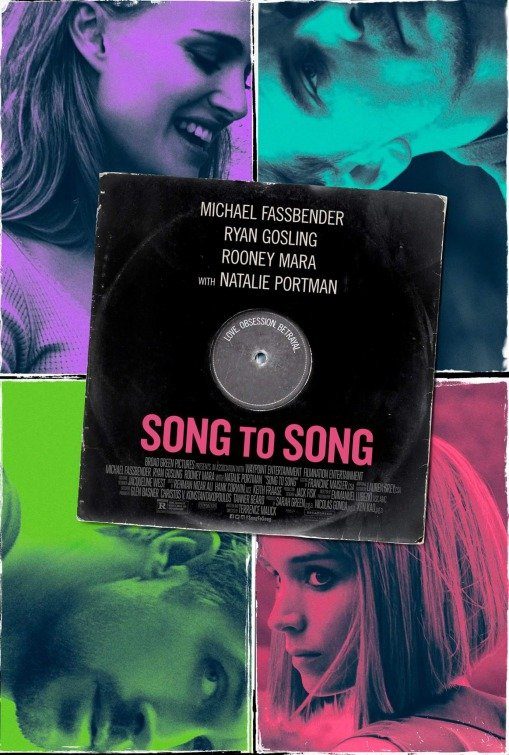“An Impressionistic Misadventure”

| None | Light | Moderate | Heavy | |
|---|---|---|---|---|
| Language | ||||
| Violence | ||||
| Sex | ||||
| Nudity |
What You Need To Know:
A constant flow of voiceover narration streams throughout this sparse plot, and even sparser dialogue, revealing the meandering thoughts of the characters. This is innovative and surprisingly interesting at first, but soon becomes tedious during SONG TO SONG’S second half. SONG TO SONG has a strong mixed worldview featuring strong Romantic elements and too much sexual immorality and nudity, combined with some Christian, biblical allusions and references making some implied moral points. Also, before Faye returns to BV, she has a lengthy affair with another woman. SONG TO SONG is too aimless, too boring, too explicit, too Non-Christian, and too immoral.
Content:
(PaPaPa, C, B, RoRo, HoHoHo, L, V, SSS, NNN, AA, DD, MM) Very strong mixed pagan worldview with some light Christian, biblical allusions and references making some implied moral points (for example, one person quotes 1 Corinthians 13:7 in saying “Love never fails” and another person visits a small Catholic church and sits down and bows his head while placing his hands on his face) that result in one morality tale but mixed with a strong Romantic premise and resolution in the movie’s other and even more primary major story, plus some very strong homosexual lesbian elements in one major subplot and strong lesbian references in a scene not having to do with that subplot; nine obscenities (seven “f” words) and no profanities; light violence includes some “slam dancing” in one scene and an implied suicide as woman’s dead body is pulled out of swimming pool, plus man’s father is dying; very strong sexual immorality and homosexuality (though usually not explicit but implied and soft, not hardcore) includes depicted and implied adultery (including one scene [the movie’s most explicit scene] where two totally nude women are on a bed and totally nude man joins them before camera cuts away), it’s implied married man sometimes has his wife take part with him in extramarital affairs with other women, lesbian kissing in several scenes, implied lesbian sex, implied fornication in several scenes, lots of belly kissing between two men and their various girlfriends (one of the two men seems to have many one night stands) or between two women, woman caresses another woman’s hand/wrist and face and shoulders in a couple scenes; partially obscured images of lower frontal female nudity in one scene, images of upper female nudity in several scenes, and images of upper male nudity in about three scenes; alcohol use and brief drunkenness (mostly music festival attendees); smoking and brief drug use; and, cheating lovers, songwriter complains to music producer/manager that manager copyrighted songwriter’s material in his name even though he didn’t write the songs, man’s mother is overtly rude to man’s new girlfriend and strongly implies she’s not right for her son, protagonists are often aimless.
More Detail:
The movie stars Ryan Gosling and Rooney Mara as BV and Faye, two songwriters who meet at a music festival produced by their manager, Cook, played by Michael Fassbender. At first, Faye seems to be Cook’s girlfriend, but she soon hooks up with BV, who’s a more tender, soulful, easygoing guy. Faye and BV really seem to have a positive connection with one another.
Eventually, however, BV and Faye drift out of love. BV takes up with a pretty blonde realtor, Amanda, while Faye has a lesbian affair with a Frenchwoman she meets in Mexico.
Meanwhile, Cook meets a pretty waitress, Rhonda, played by Natalie Portman. Though they get married, Cook is addicted to bringing other partners into their bedroom. This leads to a tragedy that finally brings the selfish, destructive record producer to his knees.
Eventually, the question becomes: Will BV and Faye ever find true happiness?
A constant flow of voiceover narration streams throughout this sparse plot, and even sparser dialogue, revealing the meandering thoughts of the characters. Much of the narration seems to belong to Faye, however.
The impressionistic style of SONG TO SONG is interesting filmmaking and storytelling at first. However, during the movie’s second half, as Faye gets involved with her lesbian lover and as Cook drifts into (mostly) implied orgies, including a threesome, with loose women or even prostitutes, the movie and its multiple storylines become less interesting, as well as more confusing. Even worse, the third act has multiple potential endings. The final ending involves Faye and BV getting back together, with both deciding to leave the unsatisfying world of alternative pop music and two meaningless affairs with no future. BV decides to get away from Austin with Faye and work in the Texas oil fields, where they want to forge what Faye calls a more “simple” life. This “happy” ending comes out of the blue, however.
SONG TO SONG’S anticlimactic ending was much more like a whimper than a bang. The movie’s last few shots show BV and Faye returning to explore a beautiful desert vista somewhere in Texas. Slowly, the sun sets and the movie ends, whereupon some lady in the audience let out a joyful, “Yay!” because the movie was finally, and at long last, over.
Another annoying problem with the move is that there seem to be many shots of people staring off into space or just walking. These scenes, when accompanied by the movie’s aimless narration, just became mind-numbing after a while.
So, although the movie’s narration, visuals and complex musical soundtrack do seem to create a few nuggets of dramatic insight, character development and narrative cohesion, they are just too aimless and move too slowly.
SONG TO SONG contains some brief Christian, biblical allusions. Also, Writer/Director Terrence Malick reportedly has compared the record producer’s character to Satan in Milton’s PARADISE LOST. Eventually, the record producer gets his comeuppance by the movie’s end, although his wife and her mother suffer much more because of his sinful shenanigans. So, the movie’s Christian, biblical allusions and references lead to a kind of morality tale in the case of the record producer’s story.
However, the resolution to the movie’s other love story, the one between BV and Faye, seems more vague and more Romantic, both morally and spiritually. Faye leaves her lesbian lover to return to BV, and they escape to live a more “simple” life, away from the center of the Austin music scene. No real reasons are given for BV and Faye’s decisions. They just come out of the blue, even though it becomes clear during the movie that not only is Faye not into her lesbian lover as much as she’s into Faye, and even though the movie’s ending states and shows that Faye and BV love one another and shouldn’t have parted in the first place. In effect, their love for one another and eventual dissatisfaction with the rock music world leads them to retreat to nature, as shown by the movie’s final shots and images set in a kind of desert vista.
Historically, Romanticism was a reaction against the European Enlightenment’s excessive rationalism as well as the new Industrial Revolution. Also, the idea of living a more “simple” life is a major aspect of many “Back to Nature” movements, which usually are highly Romantic. Although BV visits a Catholic church in one scene set in Mexico and bows his head, the movie’s Christian allusions and references don’t seem to have anything to do with the resolution of his story, including his personal realization of his continuing love for Faye and need to go back to her.
Finally, SONG TO SONG contains some strong foul language and a lot of sexual immorality. Faye’s weird lesbian relationship with the passionate Frenchwoman includes a lot of caresses from the Frenchwoman. Also, for some strange reason, there’s a lot of belly kissing in SONG TO SONG. So, most of the movie’s bedroom scenes and extramarital rendezvous are implied rather than explicit. One bedroom scene, however, does show the record producer deciding to nakedly frolic with two naked music groupies or prostitutes, who are also kissing one another on his bed. The nudity in this scene is partially obscured, but not totally. This scene leads to the devastating tragedy that occurs in the movie’s third act, but that’s no excuse for the scene’s explicit, graphic and offensive nature.
Ultimately, SONG TO SONG is an impressionistic misadventure. It’s too aimless, too boring, too explicit, too Non-Christian, and too immoral. Like many of today’s filmmakers, Terrence Malick needs a better editor, for both his screenplays and his movies.


 - Content:
- Content: 

